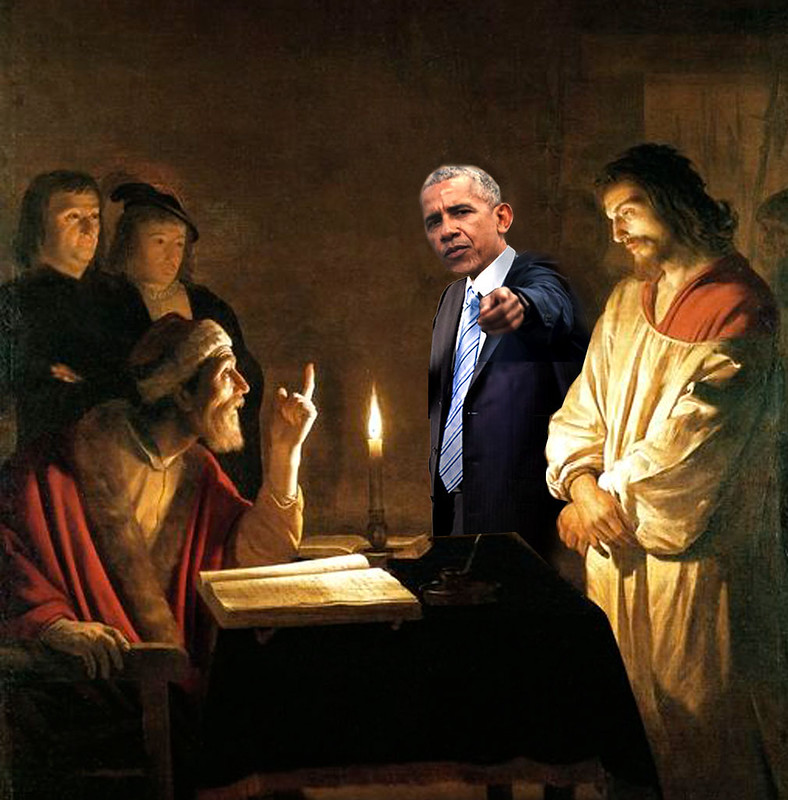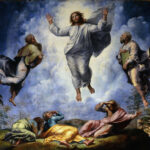Good Friday of the Lord’s Passion

Accusation or defense? by Jaci XIII, based on the painting by Gerrit van Honthorst, Jesus in front of Caiaphas. (CC BY-NC-SA 2.0) The author of this derivative work wonders if a modern character (represented by Barack Obama) would side for or against Jesus; he leaves the answer open. But Jesus wouldn’t make concessions or use diplomacy, therefore the final result would still remain unchanged, even if brought before one of our disgraceful modern courts of “justice”.
Of all the possible topics to explore in this richly detailed account of the Passion, today I’d like to dwell on the words of Jesus who, when interrogated, maintains a superior, almost defiant attitude.
One of the guards slaps Jesus in the face to punish his insolence, exclaiming: «Is this the way you answer the high priest?»
And Jesus, evidently unfazed, replies: «If I have spoken wrongly, testify to the wrong; but if I have spoken rightly, why do you strike me?”
Here he is, Jesus the young protester (!), in whom – unworthily and recklessly – I have always identified.
Since I was a child I’ve always found injustice unacceptable, especially when the search for the truth was hindered by social conventions, by the focus on honorability and by unhealthy respect for roles.
Jesus didn’t care for what was appropriate considering the position of those in front of him: he instead went straight to the point, dismantling form through the use of logic. Why should the hypocrisy of those afraid of appearances provide a cover for the human limitations (and shameful calculations) of those in power?
To my knowledge, this represents the polar opposite of what we find Far East cultures: consider the trope of the obsequious Japanese employee, bowing deeply to his boss, obeying a catastrophically wrong order, because even though he clearly sees the mistake being made, he has a moral duty to put social hierarchy first.
Jesus is not a conservative.
The conformist, moralizing prudes of his time were the Pharisees, and he put them in their place. The authorities look proverbially bad in the Gospels…
He did not seek a quiet life: he said he came to bring a sword (Mt 10:34). He didn’t found a religion designed to rubber-stamp and give support to government edicts.
It’s not really him, that crucifix hanging on a wall in our classrooms, degraded to the status of revered symbol, reminding us of a story that the post-religious man recognizes as part of his cultural background, to be preserved and appreciated, but without taking it seriously…
No, Jesus challenges his enemies, and rightfully so. He subverts a rotten order.
But he’s not a subversive. Revolutionaries are ready to overthrow the pillars of their society, but only to establish their own, different, order of things; they have a short-term vision that they claim describes the world as a whole, and they seek to get to this new order through a chaos that they cannot hope to be able to control. No, Jesus isn’t a conservative, but even more so he’s no progressive, whatever many lovers of socialism or new rights may think (and sadly, today you can find those even among priests).
Christ is beyond. Superior to factions, human quarrels, dreams that inspire our gut reactions, political theories.
With his death so atrocious, chosen as a willing sacrifice, he creates the conditions for you to necessarily recognize this superiority. Even his adversaries, over the centuries, paid him the honor of arms.
With this piece I think I have touched a concept that you won’t find discussed in homilies: Jesus does not accept to be put in a box by the system; he brings forth the truth, without making distinctions between people, without hesitating or modulating the message for diplomatic reasons.
OK, that’s not the focus of the Gospel reading: Good Friday speaks to us of the mystery of death, of a death chosen as a sacrifice, of the Death of God, of the atonement for the sins of others. It speaks to us of the condemnation of an innocent, of the Divine Being who is dragged into the subhuman condition (subhuman!) of a Crucifix.
But through this vivid and intense picture, frankness in affirming one’s reasons acquires a unique exemplary value, which should have inspired entire peoples for sure, through millennia.
On closer inspection, this idea is just one of the countless examples of how the fortune of the West derives largely from Christian doctrine. If being right, in fact, matters more than human respect and one’s status, then building something great starting from the bottom becomes possible, almost normal. We can’t be surprised that the myth of the self-made man (with all its limitations) was not born in India or China. And only the actions of a founder can produce decisive effects.
Amazing how many different reasons emerge, even difficult to enumerate for how many more keep popping up, thanks to which the Gospel has built the most advanced civilization. As a welcome side effect of the pursuit of holiness.
But let’s go back to the metaphor of the vine and the branches: those who no longer look at the Crucifix, evidently have decided to transform this modern, rich and coveted Western civilization into a pile of ruins, whether they realize it or not. A building will not stand if you destroy the foundation.
In fact, intellectuals began by questioning authority because they had a burning, intense hatred for the truth; today -among other things- they support the unbridled power of new authorities, tasked with the principled and unwavering denial of truth.
When they tell you they’re nonconformists, anti-establishment, don’t believe them. Simply put, they have a bad conscience, and are capable of anything: even exposing themselves to martyrdom. Self-sacrifice is not a sufficient criterion for separating what is good.
Having authority is not a good criterion.
Contesting authority is not a good criterion.
The only criterion is the Truth. This is hard.
Yes, hard.










































